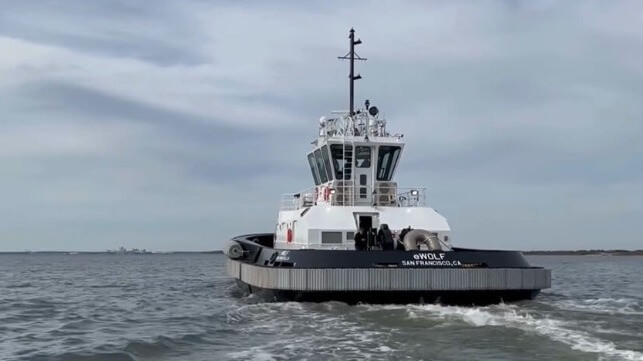Crowley Formally Christens eWolf, its First Electric Tug

Crowley Maritime has formally christened its long-awaited electric harbor tug, the eWolf, in a ceremony in San Diego. The vessel will begin providing commercial services at the Port of San Diego this week.
"The all-electric tugboat is the most technologically advanced vessel of its kind, and eWolf will help our customers and communities reach their decarbonization goals," said Tom Crowley, Chairman and CEO. “We congratulate the people whose tireless dedication brought the eWolf to fruition with our partners at the federal, state and local government, setting a new standard not just in America, but globally."
The small tug packs a considerable punch. Its battery-electric drive can produce 70 tons of bollard pull - more than the conventional tug it replaces. Its six-megawatt-hour battery array has enough power to run the workboat for a full day. For backup and transits, it has two generators on board. In normal operation, it produces zero onboard emissions - a highly-valued attribute for meeting California's stringent air quality standards - and it is expected to reduce NOx emissions by 178 tons and CO2 emissions by 3,100 metric tons during its first 10 years of service.
"Portside communities, like Barrio Logan and National City, breathe more diesel pollution than 90 percent of California communities," said CARB board member Diane Takvorian. "The eWolf will contribute significantly to creating a healthy environment for all."
The eWolf's name is a tribute to the first Crowley tug in California, the Sea Wolf. It was constructed by Master Boat Builders of Alabama, and it was outfitted with an integrated propulsion, electrical and energy storage package from ABB. It was ordered in July 2021, went out on sea trials in December 2023 and was delivered to the operator in late January 2024. Crowley has constructed a microgrid recharging station to keep its batteries topped up.
To get the projet across the finish line, Crowley had support from the port, the local air quality district, the California Air Resources Board (CARB), the EPA and the Maritime Administration.
No comments:
Post a Comment